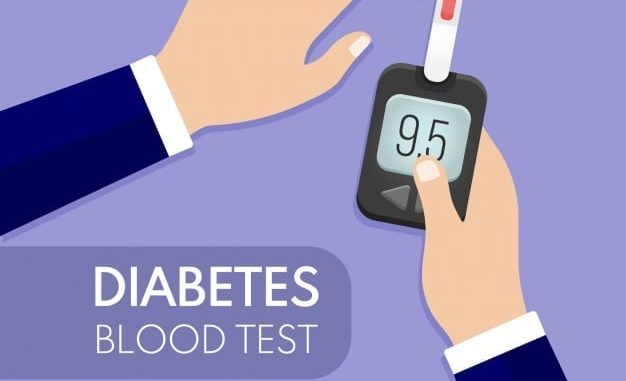
Diabetes is a chronic disease that occurs either when the pancreas does not produce enough insulin or when the body cannot effectively use the insulin it produces. Insulin is a hormone that regulates blood sugar.
Uncontrolled diabetes over time leads to serious damage to many of the body’s systems, especially the nerves and blood vessels.
Untreated high blood sugar from diabetes can damage your nerves, eyes, kidneys, and other organs.
Type 2 diabetes (formerly called non-insulin-dependent, or adult-onset) results from the body’s ineffective use of insulin. This type of diabetes is largely the result of excess body weight and physical inactivity.
Symptoms may be similar to those of type 1 diabetes, but are often less marked. As a result, the disease may be diagnosed several years after onset, after complications have already arisen.
Type 1 diabetes (previously known as insulin-dependent, juvenile or childhood-onset) is characterized by deficient insulin production and requires daily administration of insulin.
Symptoms include excessive excretion of urine (polyuria), thirst (polydipsia), constant hunger, weight loss, vision changes, and fatigue. These symptoms may occur suddenly.
Gestational diabetes, is hyperglycaemia with blood glucose values above normal but below those diagnostic of diabetes. Gestational diabetes occurs during pregnancy.
Women with gestational diabetes are at an increased risk of complications during pregnancy and at delivery. These women and possibly their children are also at increased risk of type 2 diabetes in the future.
Gestational diabetes is diagnosed through prenatal screening, rather than through reported symptoms.
Health impact
Over time, diabetes can damage the heart, blood vessels, eyes, kidneys, and nerves.
Adults with diabetes have a two- to three-fold increased risk of heart attacks and strokes(1).
Combined with reduced blood flow, neuropathy (nerve damage) in the feet increases the chance of foot ulcers, infection and eventual need for limb amputation.
Diabetic retinopathy is an important cause of blindness, and occurs as a result of long-term accumulated damage to the small blood vessels in the retina. Diabetes is the cause of 2.6% of global blindness(2).
Diabetes is among the leading causes of kidney failure(3).
Prevention
Simple lifestyle measures have been shown to be effective in preventing or delaying the onset of type 2 diabetes.
To help prevent type 2 diabetes and its complications.
People should achieve and maintain a healthy body weight , be physically active – doing at least 30 minutes of regular, moderate – intensity activity on most days. More activity is required for weight control, eat a healthy diet, avoiding sugar, saturated fats, and avoid tobacco use – smoking increases the risk of diabetes and cardiovascular disease (heart disease).
General symptoms of diabetes include:
increased hunger
increased thirst
weight loss
frequent urination
blurry vision
extreme fatigue
sores that don’t heal
Symptoms of type 1 diabetes can include:
extreme hunger
increased thirst
unintentional weight loss
frequent urination
blurry vision
tiredness
In addition to the general symptoms of diabetes, men with diabetes may have a decreased sex drive, erectile dysfunction (ED), and poor muscle strength.
Women with diabetes can also have symptoms such as urinary tract infections, yeast infections, and dry, itchy skin.
Complications associated with diabetes include:
heart disease, heart attack, and stroke
neuropathy
nephropathy
retinopathy and vision loss
hearing loss
foot damage such as infections and sores that don’t heal, skin conditions such as bacterial and fungal
infections
depression
dementia
Causes of Diabetes
Family History: The risk increases if either your parents or siblings have type 1 diabetes
Environmental Factor: Circumstances such as exposure to a viral illness likely play some role in type 1 diabetes
High Blood Pressure: Having blood pressure is linked to an increased risk of type 2 diabetes.
Age: Your risk increases as you get older. This may be because you tend to exercise less, lose muscle mass and gain weight as you age.
EXPOSED! The Hidden Secret They Don’t Want You To Know. How To Completely Reverse Diabetes Naturally In 4 Weeks.
Diabetes can be reversed.
Contrary to what you’ve been told – that you need medications for life; it’s possible to reverse diabetes naturally
The 100% Natural tharpy for diabetes treatment, is affordable to everyone with diabetes problem, for more information on treatment and prevention .
Cantact Dr. Chigozie Adiole
08035344724. Or 09042359127
What’s app +234-9042359127
Divine power natural tharpy , block 4and5 aba main Park extension , opposite aba town hall aba abia state
